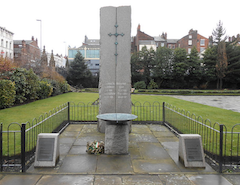
- The Great Hunger Memorial, St Luke’s Church, Liverpool, where President Higgins delivered his remarks.
(Image via Wikipedia)
Last week, the President of Ireland, Michael D Higgins, in response to questions from reporters during an official visit to Liverpool in the UK, made a number of unscripted remarks about a current political controversy in Ireland. The Presidency of Ireland is not an executive office in the same way as the Presidents of the US and France are – Ireland is a parliamentary democracy like the UK where the head of the executive is the Taoiseach (Prime Minister). Rather, the Presidency of Ireland is a largely ceremonial office, in much the same way as the Presidents of Italy and Germany are. As a consequence, the President’s remarks were seems as political and controversial. He denied overstepping the mark, and robustly defended his comments, but the incident has raised questions as to the limit of the President’s avowedly evolving role. Two articles recently published in the Irish Times neatly encapsulate the competing views. On the one hand, David Gwynn Morgan, Professor of Law Emeritus, UCC, argued that it was never intended for the president to act as a more effective opposition leader:
Pitfalls of pushing out presidential boundaries
… the issue is whether he went beyond his proper authority. … There are large areas in which he may take an initiative. … But it is reasonable to expect, when the government has reached a decision or established a policy, that the president should refrain from criticising it in public. And this principle would naturally extend beyond the government to a public body like the Health Service Executive.
He bolstered this by arguing that, in the few cases where the President’s powers go beyond the ceremonial, and where he has to make what amounts to a substantive decision about the political process, he has the confidence of politicians and the public that he is “above politics”. But if he pushes the boundaries of the office too much, and is perceived as political by the politicians or the public, then the neutrality that is necessary for the exercise of those few substantive powers is lost.
On the other hand, Dr Eoin Daly, Lecturer in Law, UCD, argued that, whilst the Presidency is an eccentric and ambiguous institution, the President’s remarks last week were not at all inappropriate, and that Prof Morgan overstates not only the significance of what the President said, but also the broader constitutional requirement of presidential “neutrality”.
President is free to express more than platitudes
… it simply isn’t true that the Constitution confines the president to discursive platitudes – to saying nothing that might be interpreted as inconsistent with the policies of the government. There is some constitutional basis for the view that the president is bound to “neutrality” in public affairs, but it is vastly overstated. … there is no … restriction on the president’s public utterances generally – it would be impracticable for the government to review every item of presidential speech.
Thus our presidents enjoy some constitutional freedom in the values and principles they project. It is well within the presidential ambit to formulate a sense of national values and to articulate broad matters of national concern.
As to Prof Morgan’s argument that, in speaking out, the President risks losing the neutrality that is necessary for the exercise of his few substantive powers, Daly argues that such neutrality is illusory, where silence often simply reinforces the status quo.
In my view, there must be a very strong reason to restrict freedom of expression, whether it is the rights of a person to comment on a politician, or the right of a politician such as the President to comment on a person’s plight. On the balance of the arguments between Morgan and Daly, I don’t find in the former a strong enough reason to restrict the President’s freedom of expression. Rather, in my view, Daly’s view is the more convincing. I therefore look forward to hearing more from the President as he pushes the boundaries of his office and comments on the issues he encounters as he does so.
This is a hangover. No one in their correct mind holds that the POI is about to order a la Sir John Robert Kerr a dissolution. This was an insert to quench any residual powers that that were held after the Statutes of Westminster and the Abdication Crises. That we expect our President to shut his mouth and busy himself with poetry and medal giving in 2012 is utter hooey. And I’ll guarantee you this much, we far prefer listening to an educated hopeful human being with a vision (agreeing or not) than semi educated twinkles that populate the ranks of the other houses.
My only wish is we had built him decant home that didn’t have really nasty connotations and gave over the vice-regal lodge to something invisible like Overseas Aid.
P.S. there is no Constitutional fuss unless the sovereign citizen makes it so.